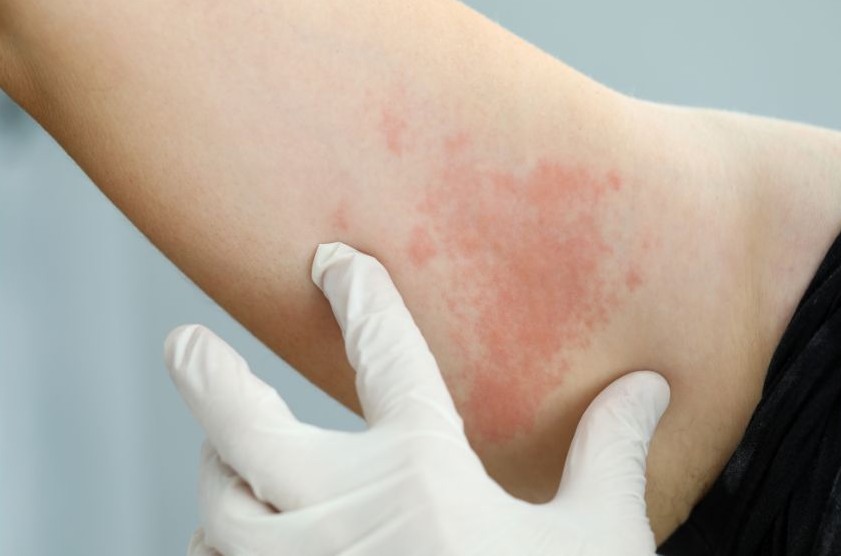How Viral Infections Like COVID-19, Chickenpox, Measles, or Mumps Can Cause Gut Issues and Trigger Health Conditions Like Histamine Reactions
Viral infections such as COVID-19, chickenpox, measles, and mumps are often associated with respiratory symptoms, fever, and general malaise. However, there’s increasing evidence that viral infections can also have a significant impact on gut health, leading to gastrointestinal issues and triggering other health conditions, such as histamine intolerance and immune dysregulation.

The Gut-Virus Connection
The gut is home to trillions of bacteria, fungi, and other microorganisms that make up the gut microbiome, which plays a crucial role in regulating the immune system, metabolism, and even mental health. When a virus infects the body, especially one as disruptive as COVID-19, it can disturb this delicate balance. For example, research has shown that COVID-19 can enter the gastrointestinal tract through ACE2 receptors, causing direct damage to the gut lining and altering the gut microbiota.
Similarly, viruses like chickenpox, measles, and mumps also have systemic effects that can lead to gut imbalances, even if they don’t cause gastrointestinal symptoms directly. The immune response to these viruses, as well as the inflammatory processes they trigger, can cause disruptions in the gut that lead to conditions like dysbiosis (imbalance in gut bacteria), leaky gut syndrome, and increased histamine production.
Viral Impact on Gut Health
- Inflammation and Gut Dysbiosis: Viral infections cause widespread inflammation in the body. In the gut, this inflammation can damage the intestinal lining, leading to conditions like leaky gut, where the lining becomes more permeable. When this happens, bacteria, toxins, and partially digested food particles can “leak” into the bloodstream, causing systemic inflammation and triggering immune responses.
- Histamine Overload: When the gut is inflamed or damaged, it may produce or fail to break down histamine effectively. Histamine is a chemical involved in immune responses, digestion, and central nervous system function. Under normal circumstances, the body regulates histamine levels, but when the gut is compromised, histamine can build up and lead to intolerance. This manifests as symptoms like rashes, headaches, nausea, and fatigue.
Viral infections like COVID-19 and chickenpox can alter the balance of gut enzymes responsible for breaking down histamine (such as diamine oxidase or DAO), leading to higher levels of circulating histamine and subsequent reactions like itching, hives, or gastrointestinal discomfort.
- Immune Dysregulation: The gut houses a large portion of the body’s immune system. When viral infections disrupt the gut, they can impair immune function. This immune dysregulation can trigger or exacerbate autoimmune conditions, food intolerances, or sensitivities. Viruses can also cause long-term issues by “reprogramming” the immune system, making the body more prone to inflammatory responses, including histamine reactions.
- Long-Term Gut Effects from COVID-19: There is ongoing research into “long COVID,” where patients experience long-term symptoms even after the virus has cleared. Among these symptoms are gastrointestinal issues such as diarrhea, bloating, and abdominal pain, which may be caused by persistent inflammation in the gut and disrupted microbiota.
Examples of Other Conditions Triggered by Viral Infections
- Histamine Intolerance: As mentioned earlier, disruptions in gut health can lead to an inability to properly metabolize histamine, causing intolerance. Symptoms of histamine intolerance include headaches, flushing, nasal congestion, fatigue, and digestive issues.
- Food Sensitivities: Gut damage or dysbiosis caused by viral infections can also lead to food sensitivities, as the immune system becomes hyper-responsive to certain food particles that “leak” through the gut lining into the bloodstream.
- Irritable Bowel Syndrome (IBS): Viral infections have been linked to the development of post-infectious IBS. For example, after a significant viral illness, individuals may develop ongoing gut symptoms like diarrhea, constipation, or cramping, which are hallmark signs of IBS.

How to Support Gut Health After a Viral Infection
- Restoring Gut Microbiome Balance: Probiotic-rich foods such as yogurt, kefir, sauerkraut, and kimchi can help replenish beneficial bacteria in the gut. Probiotic supplements may also be useful for restoring microbiome balance.
- Supporting Gut Lining Repair: Nutrients such as L-glutamine, zinc, and omega-3 fatty acids can help repair the intestinal lining and reduce inflammation in the gut. Bone broth is also great for supporting gut health.
- DAO Enzyme Support for Histamine Intolerance: If histamine intolerance is suspected, individuals may benefit from avoiding high-histamine foods (such as aged cheeses, fermented foods, and alcohol) and taking supplements that support DAO enzyme activity, which helps to break down histamine. However I do not recommend using these without the support of an experienced practitioner as assessing symptoms & adjusting your regime as required is very important here.
- Anti-inflammatory Diet: To reduce overall inflammation, following an anti-inflammatory diet rich in whole foods like leafy greens, berries, nuts, seeds, and lean proteins can be beneficial. Avoiding processed foods, refined sugars, and excessive alcohol intake is also key.
To Sum it Up
Viral infections such as COVID-19, chickenpox, measles, and mumps are not only acute illnesses but can also have long-term effects on gut health. The gut is intricately linked with the immune system, and when disrupted by these viruses, it can lead to a host of other conditions, including histamine intolerance, food sensitivities, and even IBS. Supporting the gut through a balanced diet, probiotics, and proper care can help mitigate these effects and promote overall well-being.
As research continues, it’s becoming clear that the gut plays a central role in how our bodies respond to and recover from viral infections. By understanding this connection, we can take proactive steps to support our gut health and reduce the risk of related health complications.

